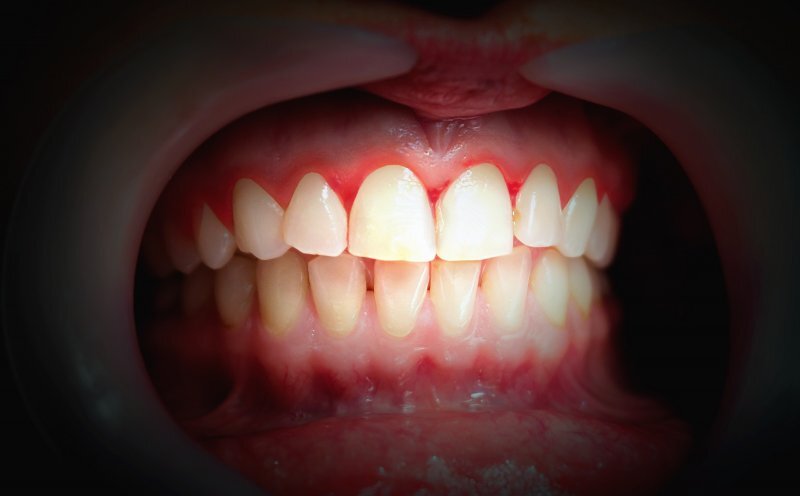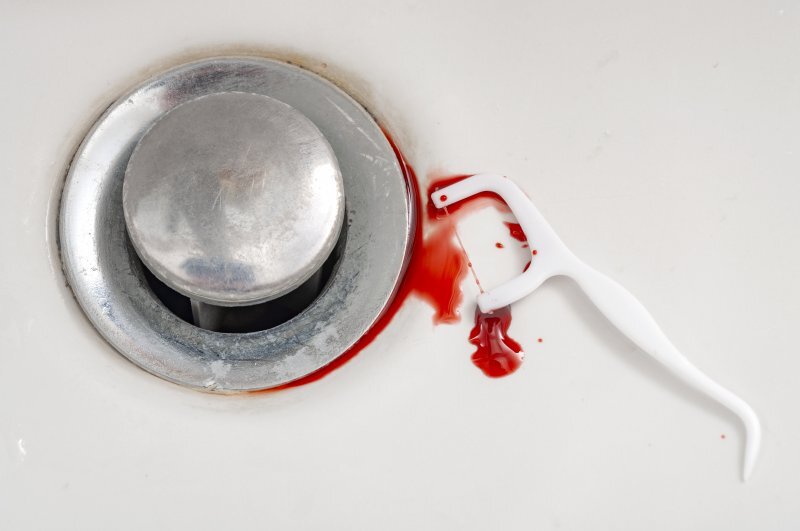The soft gum tissue that surrounds your teeth is sensitive and can bleed from time to time. Do you ever notice your gums bleeding during flossing or brushing? It is not uncommon for gums to bleed even during a dental cleaning, no matter how gentle we are. At our clinic in Saskatoon, we often get asked, when should you be concerned about bleeding gums, and what can you do about it?

Why do my gums bleed?
The most common cause of bleeding gums is gingivitis or early periodontal disease, but your gums may bleed for a number of other reasons. It is best to discuss bleeding gums with your dentist so you can work together to find a solution if one is needed. Other conditions that can cause bleeding gums include:
- Vitamin deficiency (vitamins A and K)
- Brushing too hard or flossing for the first time in a long time
- Tight-fitting dentures or ill-fitting mouthguards and retainers.
- Bleeding disorders such as leukemia or hemophilia
- Blood-thinning medications such as warfarin, heparin, or aspirin
The leading cause of bleeding gums is gingivitis.

Gingivitis is the earliest stage of gum disease, and it’s more common than you might think; 70% of Canadians will develop gum disease at some time in their lives. Cases of gingivitis can be isolated to the gum tissue around one or two teeth, or it may be more widespread. Often without symptoms, early gum disease can sneak up on you. If you are experiencing bleeding gums accompanied by soreness and redness, speak to your dentist immediately. Early gum disease is treatable and even reversible with the proper oral care response.
What can you do about bleeding gums?
Find out the cause of your bleeding gums by talking to your dentist about gum health, and see your doctor about your medications and vitamin levels. Most importantly, watch closely for signs of gingivitis and book an appointment with a dentist if you detect any redness, swelling, soreness, or other symptoms of gingivitis alongside the bleeding.
How can I prevent my gums from bleeding while flossing?
It might feel counterintuitive, but the best thing is to continue flossing regularly. As long as the bleeding doesn’t last long after you finish flossing, you shouldn’t be concerned. It is usual for gums to be sensitive to flossing if it’s new or if you don’t floss frequently enough. After establishing a routine of daily flossing, your gums will stop bleeding.
Saskatoon folks often ask us the best way to treat gingivitis outside the dental clinic.
Seeing your dentist is the best way to properly diagnose the severity of your gingivitis and get treatment advice. You can talk to your dentist about your dental concerns at your twice-annual professional cleaning, which will remove the tartar and plaque buildup that causes gingivitis.Outside the clinic, the best way to treat gingivitis is to maintain good oral health. If you are developing gingivitis, amp up your oral care routine to brush and floss 2-3 times daily or more—think of it as deep cleaning, and keep it up until the gingivitis clears up. Read our blog with tips for the most effective oral home care routine. We also recommend avoiding sugary or acidic foods, as they accelerate the spread of plaque bacteria.
Saskatoon, regular oral hygiene services are the best protection against bleeding gums.
Of course, prevention is always the best treatment, and luckily preventing bleeding gums caused by gingivitis can be done in 4 steps:
- Seek professional dental cleanings twice annually
- Brush and floss daily to prevent plaque bacteria and tartar build-up
- Limit your intake of sugary or acidic drinks and foods
- Quit smoking and vaping
Can’t come in for a cleaning? Ask a Saskatoon dentist about your bleeding gums with a Virtual Dental Appointment!
Gingivitis is the leading cause of bleeding gums, and mild cases are no cause for serious concern but need to be addressed immediately to prevent the progression of gum disease. Keeping your teeth clear of plaque and tartar is the best way to prevent bleeding gums caused by gingivitis, but it’s important to rule out other potential causes for your bleeding gums. The oral care team at Blok Dental is here for you! Schedule a virtual appointment today.
